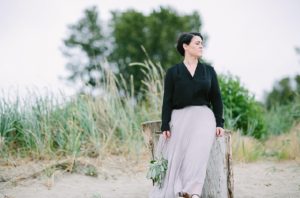Genesa Greening, president and CEO of BC Women’s Hospital & Health Centre Foundation, with her son Nnamdi. Photo by Claudette Carracedo.
By Loose Lips Mag
@looselipsmag
Since 2016, BC Women’s Hospital & Health Centre Foundation has quadrupled its revenue, grown its staff by 17 people, and inspired powerful discussions. Not coincidentally, that’s when Genesa Greening took over as the foundation’s president and CEO.
Greening, who was recently named among the Top 100 Most Powerful Women in Canada by the Women’s Executive Network (WXN), has influenced these tangible changes in just two years, but under her care, a more philosophical revolution in women’s health is taking place.
“You look at what’s happening societally, politically, and within the healthcare system and I truly think that within the next 10 years we are going to see the most substantial movement in women’s health that we have ever seen before,” Greening tells Loose Lips Mag.
On meeting her, it’s not hard to see why Greening has been recognized as one of Canada’s 100 most outstanding women; women who have advocated for equity in the workforce, and who serve as an inspiration for the next generation of leaders.
Her background in the non-profit sector, social justice organizations, and philanthropy led her to BC Women’s in a role that, ultimately, marries her values and 22 years of experience in advocacy.
“We’re storytellers as women. We consume story, we tell story, we see ourselves in story. So, a big part of our job as a foundation moving forward is sharing the story,” she says.
As president and CEO of the foundation, her role calls for the facilitation of philanthropic financial investment for women. In layman’s terms, Greening is the catalyst to acquiring the research dollars that will catapult the health and wellness of women everywhere.
“When I was given an opportunity to put my hat in the ring for this job I really saw a tremendous opportunity for a confluence of my entire career experience in one role,” she says.
“It was a great chance for me to take my advocate heart, my ability to facilitate substantial philanthropy to build organizations, because I’ve rebuilt or revamped several organizations over my career, and to find that all together. Then, it just turned out that it’s a really good time to be in the women’s space in general with the conversation really in our favour right now.”
As the only pan-provincial women’s health institute in the country, the organization of 225 members has invested in finding answers in women’s health. The research institute at BC Women’s (WHRI) serves to provide groundbreaking knowledge on women-specific medicine, including endometriosis, pelvic pain, sexual health mindfulness, HPV, cervical cancer, and perinatal substance use.
“The reason I advocate for research is that you don’t know what you don’t know. The reality is that when it comes to women’s health and women’s unique physiology, we don’t know nearly enough,” explains Greening.
“Women have only been involved in clinical trials in this country since the late ‘90s and it can take up to 15 to 17 years for research to become policy and practice. So when you start to do some of that math, it clearly puts us at a disadvantage as women.”

Greening is a self-proclaimed unapologetic feminist, so, naturally, BC Women’s takes an intersectional approach to advocacy and care.
“One of the things that I value highly about being aligned with this particular hospital and research institute is that within our models of care we think about the social determinants of health wherever we possibly can,” Greening asserts.
“Looking at poverty, looking at education, looking at access, looking at race, looking at age and stage of life—all the things that actually really do matter in people’s health outcomes…. Research is a great marriage to those [aspects] in being able to look at how we can address them holistically,” she says.
“I think we have lots of amazing programs here at BC Women’s that do work with people living in the margins.”
Here, women can find more than 40 clinics for all of their healthcare needs.
Take, for example, programs such as Fir Square, the first clinic in Canada to care for women who use substances and their affected newborns; Oak Tree Clinic, an HIV program for moms and their kids; and the ACCESS clinic, which caters to women and transgender patients with disabilities.
The tailoring to specific women’s health issues provided by these clinics goes hand-in-hand with the saying “Nothing About Us Without Us,” a kind of mantra at the hospital foundation.
“It’s not a crazy request that when I get prescribed something that I shouldn’t be worried as to whether or not it’s been gendered in its analysis,” Greening says, explaining that the majority of pharmaceuticals have been prescribed based on a 155-pound man.
“I want to know that when I go see a doctor that what I am being told or how I’m being diagnosed or how I’m being treated takes into account my gender.”
For example, endometriosis (a painful disorder in which the tissue that normally lines the inside of a uterus grows outside the uterus, affecting the ovaries, fallopian tubes and the tissue lining the pelvis) is often mislabeled a “white woman’s disease,” according to Greening.
The reality, she says, is that endometriosis is a misunderstood and often misdiagnosed disease, and if there is a woman who is going to be more likely believed, it’s a white woman.
“So the bias is also still within gender, and so there’s a challenge even with understanding conditions that are solely in the women’s space. We have a long way to go for sure,” she admits.
Whether it’s advocating for autonomy, for free universal contraception, or for accessibility for all, Greening is effectively turning up the megaphone so women can be heard.
“I’m a big believer that health is an equalizer,” Greening says. “And if you are able to be healthy mentally, physically, and spiritually you’re in a far better place to move your life in the direction you want to move it in.”

Kristi and Brittany are the co-founders and co-editors of Loose Lips Mag. Together with intern Tayvie, they’re building their feminist media empire—leaving the patriarchy, charcuterie boards and empty bottles of wine in their wake. Loose Lips Media is grateful to operate on the unceded Coast Salish territory of the Musqueam, Squamish and Tsleil-Waututh First Nations.




